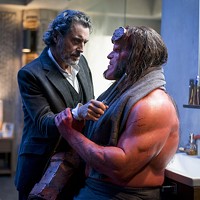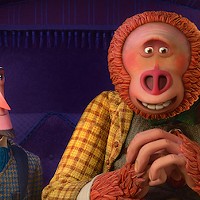

Page 3 of 9
DRIVE The latest in a long line of silent anti-heroes as the ultimate in celluloid cool, Ryan Gosling plays a character known only as Driver. He's employed as a wheelman for crooks, but that's merely the least reputable of his three jobs: When he's not working on the wrong side of the law (as illustrated in a spectacular opening set-piece), he's a movie stunt driver as well as a mechanic in a garage owned by the shady Shannon (Bryan Cranston). Shannon is his link between all three jobs, which becomes problematic once they get involved with a pair of high-end criminals with notable cruel streaks: Bernie Rose (Albert Brooks), a former Hollywood producer, and his crude partner Nino (Ron Perlman). Causing even further complications is Driver's growing affection for his neighbor Irene (Carey Mulligan), who has a young son (Kaden Leos) in her care and a husband (Oscar Isaac) on the way home from the clink. Danish director Nicolas Winding Refn, who won the Best Director prize for Drive at this year's Cannes Film Festival, has fashioned a work that's as slick as its protagonist: Its muted Euro-sheen mingles easily with its American atmospherics, and it's all punctuated by bouts of brutal and unsightly gore that never feel like exploitive overkill but instead serve to feed the urgency of the moment. Aside from a curiously miscast Mulligan, the entire supporting roster is strong, although Brooks deserves his own standing ovation. The nebbish from Broadcast News and Lost in America has been reconfigured as a slow-burning sadist, and it's a sight to chill the spine. Drive is such a sterling achievement for most of its running time that it's alarming when it crashes and burns during its final 15 minutes. After approximately 90 minutes of careful buildup, the end feels maddeningly rushed, with the actions of various characters bordering on the illogical and their fates succumbing to genre expectations. This unfortunate turn of affairs doesn't irreparably damage the overall package, but it does leave its mark, as surely as oil leaking from a rusty pickup puttering down the highway. ***
HUGO Movie mavens startled by the fact that Martin Scorsese has elected to direct a family film when he's exalted for his string of hardcore crime flicks clearly know little about either the man or his achievements. Scorsese has hopscotched between genres far more often than he's given credit for — the costume drama The Age of Innocence, the religious epic The Last Temptation of Christ and the black comedy After Hours represent just a sampling — and when he's not helming motion pictures, he's often championing the cause of film preservation. Scorsese has always been a student of film as much as a teacher and practitioner — how I love to hear him passionately discuss classics of cinema! — and with Hugo, he manages to incorporate all facets of his persona. Even more so than The Aviator, this adaptation of Brian Selznick's The Invention of Hugo Cabret is a product steeped in cinema lore, drunk on the fumes of a bygone era yet canny enough to channel its nostalgia through modern innovations. Set in a Parisian train station in the 1930s, the story concerns itself with young Hugo (Asa Butterfield), a parentless child who tends to the building's giant clock while constantly avoiding the grasp of an inspector (Sacha Baron Cohen) hellbent on sending him off to an orphanage. Connected to his late father (Jude Law in a small role) by an automaton that needs repairing, Hugo steals the parts needed from an elderly man named Georges Méliès (Ben Kingsley), who runs a toy store in the station. Eventually caught by the ill-tempered gent, Hugo becomes drawn into his life, befriending his ward Isabelle (Chloe Grace Moretz, of Kick-Ass/Hit Girl fame), learning about his past as a film pioneer, and discovering the key — literally — that binds past and present together. Despite registering as a glorious celebration of Méliès, Scorsese hasn't merely made an ode to cineasts; rather, his picture is a moving exploration of the manner in which individuals seek out love and companionship in an effort to form their own version of a nuclear family (every character, even Cohen's bumbling inspector, wages a war against loneliness). The 125-minute running time, leisurely pace and lack of Muppets will probably cause many tots and grown-ups alike to grow fidgety before long, but for the rest of us, we'll always have Paris — and the enchanting movie set therein. ***1/2
THE IDES OF MARCH Friends, Charlotteans, countrymen, lend me your ears; I come to bury Clooney, not to praise him. It's not that I love Clooney less, but that I love good movies more. And for huge chunks at a time, The Ides of March is a good movie. What's more, director-producer-cowriter-star George Clooney is not only a fine filmmaker but also a fine American, espousing the progressive ideals that, when adopted by those in charge, help make this country great. These ideals are regurgitated in this slick motion picture (adapted from Beau Willimon's play Farragut North), with the suave leading man using his charisma to punch across the character of Governor Mike Morris, a presidential aspirant locked in a heated battle with another Democrat for the party's nomination. His press secretary, Stephen Myers (Ryan Gosling), believes in him and works hand in hand with campaign manager Paul Zara (Philip Seymour Hoffman) to insure victory. Stephen is ambitious and intelligent, so it's no surprise that the opponent's campaign manager (Paul Giamatti) tries to lure him to their side, that a New York Times reporter (Marisa Tomei) turns to him for insider info, and that a cute intern (Evan Rachel Wood) climbs into bed with him. But Stephen gets blindsided by dirty politics — literally — and is further stunned to discover a secret that could derail the whole campaign. This is basically Gosling's movie, which is a good thing since Clooney's character largely just shows up to deliver speeches that reflect the actor's real-life liberal leanings. It's not that I disagree with what's being spoken, but there are more inventive ways for a film to lay out its agenda without resorting to ham-fisted proselytizing (see: Bulworth; Bob Roberts). Yet ultimately, the movie's simplistic view of the political landscape is no worse than the melodramatic turn it takes late in the game. Still, despite its faults, there's much to enjoy, starting with the superlative performances by old pros Giamatti and Hoffman and the still-rising Wood. The Ides of March is satisfying and frustrating in equal measure; just mark it down as a split ticket. **1/2


